Living with Water: Lessons from Rotterdam

12 February 2019

11.00 am – 12.30 pm. Registration from 10.30am, seated by 11.00am

MND Auditorium, MND Annex A, 5 Maxwell Road Singapore 069110

2 BOA-SIA CPD pts, 2 SIP CPD pts, 1 SILA CPD pt, 1 PDU (PEB), 2 PDU (ABC WP) and 2 PDU (QECP)
Resources
Lecture Poster (PDF: 295 KB)
Mr Johan Verlinde's Slides (PDF: 7.9MB)
Lecture Video & Photos
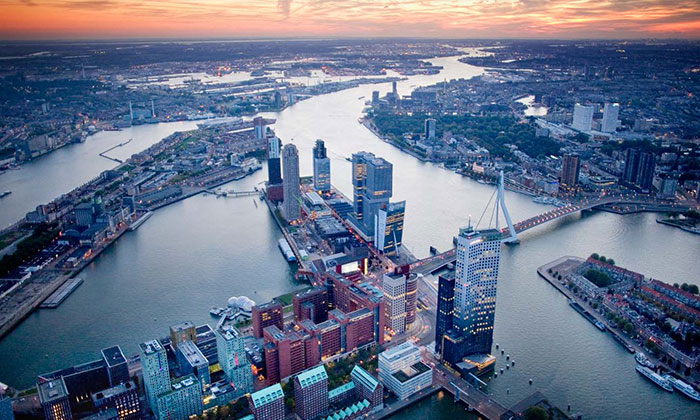 Source: Rotterdam
Source: Rotterdam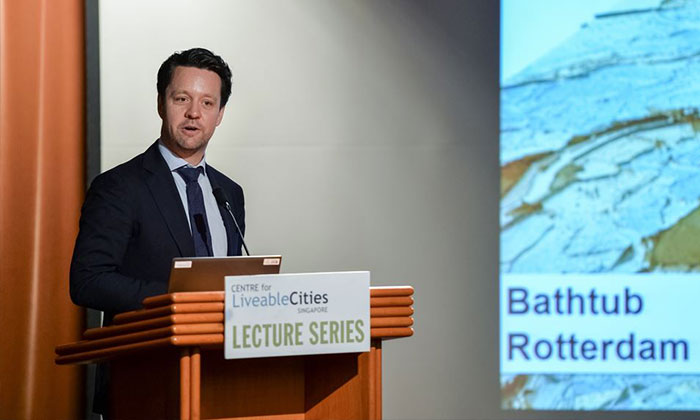 Source: Centre for Liveable Cities
Source: Centre for Liveable Cities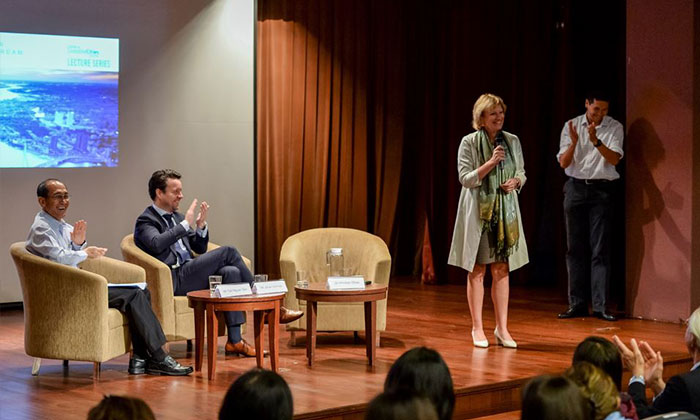 Source: Centre for Liveable Cities
Source: Centre for Liveable Cities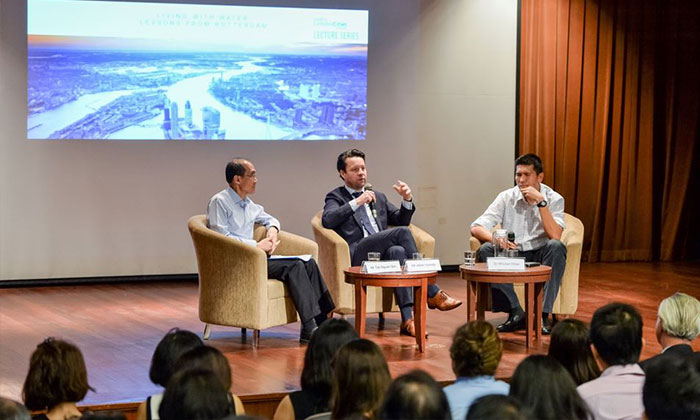 Source: Centre for Liveable Cities
Source: Centre for Liveable Cities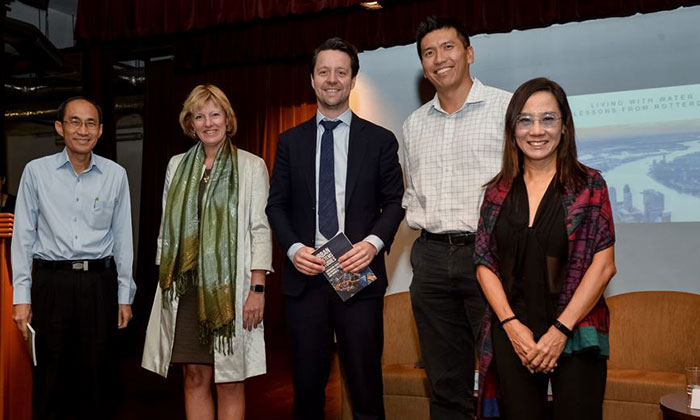 Source: Centre for Liveable Cities
Source: Centre for Liveable Cities
Lecture Report
“We work together with the Dutch engineering firm Royal HaskoningDHV and the insurer Achmea on the Blue Label (scheme). Every house has an energy (efficiency) label by European law, and the (Blue Label scheme) does the same for risk of flooding. The Blue Label is a way to communicate with citizens and an incentive to do something at an individual house level.” - Johan Verlinde
Good drainage and pumps are not enough to fight climate change. Besides building innovative infrastructure, cities must also engage their citizens to create a resilient and robust system, said Johan Verlinde, the program manager of Rotterdam’s Climate Adaptation Plan.
During his recent CLC Lecture, “Living with Water: Lessons from Rotterdam”, Verlinde shared various solutions that the Dutch port city has co-created with its population of some 600,000 to manage the impact of rising sea levels and changing weather. These multi-functional projects range from a large water storage facility that doubles as an Olympic rowing track to water squares that combine public spaces with room for rainwater retention in the city.
“We have to adapt our city, and we rely on other developments in the city, so we have to link in and work together with everyone active(ly) in the city. By doing so, we can create an added value to environment, ecology, economy and society,” he said.
For instance, Rotterdam asked its citizens what functions they wanted in the city’s water squares during the design. While one became a space for bike riding and skating, another was turned into a stage for a theatre school. A water square even became a place for baptising children to cater to a nearby church.
Although climate adaptation design may sometimes entail higher financial costs at the outset, they can pay off in the long term, said Verlinde. By thinking of them as assets, cities can find solutions that not only improve climate resilience but also enhance the quality of its living environment.
“There’s a nice link between asset management and climate adaptation, because with asset management, you can prioritise your projects,” explained Verlinde. “That may sound like comparing apples and pears, but it’s about going a level deeper and examining what you really want for the city.”
To date, Rotterdam’s climate adaptation projects have mainly been led by the public sector, but the city now wants to involve the private sector more because they own and manage some 60% of its spaces.
“If we want to make the city climate-proof, we need that 60%,” explained Verlinde. “With our new adaptation strategy, we are planning to focus a lot more on the private properties. We work together with social housing corporations, and motivate them to adapt to green roofs, water storage roofs, de-pave gardens and add more green(ery).”
This shift is also part of a larger movement in Rotterdam to use education, regulation and subsidies to empower citizens to make their neighbourhoods more attractive while tackling climate challenges. “The movement we try to achieve is this: years ago, we designed for Rotterdammers. We moved to designing with Rotterdammers, and the new project is about (design) by Rotterdammers,” said Verlinde.
To achieve this goal, the city is framing discussions about climate change in the context of improving the neighbourhood in order to make the subject more relatable. This is an example of how effective communications is key in getting buy-in from different sectors of society.
During the post-lecture discussion, Tan Nguan Sen, a fellow panellist and senior consultant at Singapore’s water agency PUB, reiterated the importance of involving citizens in the fight against climate change. After all, infrastructure can only take care of 90% of its effects, he said.
“For the extreme events, your infrastructure will not be able to cope, and there’ll still be flooding and other effects. How do you get citizens to be involved in not just co-creating the solution, but also have social resilience and cope with (extreme) events?” asked Tan.
One solution is getting citizens to participate earlier in the conversation. Rotterdam used to share plans and designs with citizens only when they were close to completion, and Verlinde said they realised it was a mistake.
“They said: ‘do you call this participation? We want to be involved in an earlier stage’,” he recalled. Now, Rotterdam tries to rope in its residents in the design process much earlier. “If they know the problems of a city, and that it’s not only the challenge of the city, but also of the citizens, we can work together in fighting climate change.”
About the Speakers
SPEAKER
Mr Johan Verlinde
Program Manager
Rotterdam Climate Adaption Plan
Johan Verlinde graduated at the Technical University Delft with a bachelor in Civil Engineering and a master in Water management. He works for the City of Rotterdam as the program manager of the Rotterdam Deltaplan Climate Adaptation. The goal of the plan is to take the next step in preparing the city for climate hazards like heavy rainfall, heat and drought. This is done in close collaboration with citizens, private sector, social housing corporations, water boards and more. Besides climate adaptive measures in the public space, where space is scarce, climate proofing the private space will become more and more important. He also works with various different international cooperation’s to share and gain knowledge on climate adaptation.
PANELLIST
Mr Tan Nguan Sen
Senior Consultant
PUB, Singapore's National Water Agency
Mr Tan Nguan Sen currently holds the post of Senior Consultant in PUB. In over 30 years of public service, he served in various capacities in the key operational departments in PUB and the job scope ranged from policy development, planning and design work, project management and operations and maintenance. He has played a pivotal role in driving stormwater management, water resource and sustainability initiatives for Singapore and PUB, including the development of the ABC Waters Programme. As part of PUB’s plans to tackle climate change, he is also heavily involved as a Project Director of floating solar PV and climate adaptation projects.
MODERATOR
Dr Winston Chow
Assistant Professor Department of Geography
National University of Singapore
Dr Winston Chow is an Assistant Professor of Geography at the National University of Singapore researching on how cities affect weather & climate, and how weather & climate affects cities. He is a Principal Investigator for the Cooling Singapore initiative , and was recently selected by the Intergovernmental Panel on Climate Change (IPCC) to be a Lead Author for their Cities chapter in the Sixth Assessment Report on Climate Change due in 2021. He enjoys talking and writing about these research issues, and he tweets sporadically on many topics (unrelated to climate change) at @winstontlchow